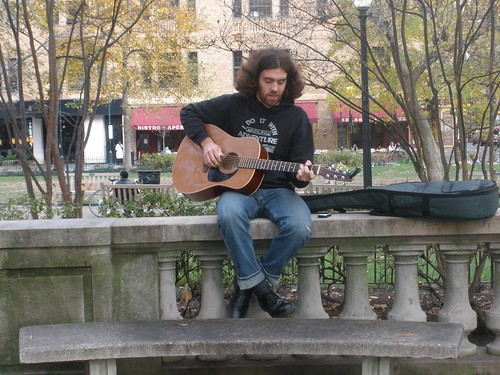Rittenhouse Square musicians tell stories and successes of their lives as street performers.
In a city where nature acts as the backdrop to a concrete stage, all one needs is a hat and some talent to make it in Rittenhouse Square.
“After shopping on Walnut [Street], I like to come here and just enjoy the tranquility of the square and, when I get lucky, watch some cool or weird performances,” sophomore Yakira Young said.
When the weather is nice and there isn’t any nearby construction, performers rule the square.
“I play because I enjoy the reactions of people – old people, young people, everyone,” musician Philip De’Genova said.

De’Genova said he has been playing in the square for a couple of years. Equipped with his flute, music stand and belongings, he sets up in front of a statue to play contemporary music.
“I play all types of music that appeals to all groups. Being a performer, for me, is to be a part of the exchange between people without the immediate use of words,” De’Genova said.
This is a common feeling shared with the patrons of Rittenhouse.
“I come to Rittenhouse to escape, even if it’s just for 15 minutes,” said Whitney Ajibola, a sophomore from New York, who said the Philadelphia landmark reminds her of a staple of her hometown, Central Park.
A certain level of respect exists among the performers in the park. Guitarist Julian Root has been performing in Rittenhouse for three years and has met the majority of his bandmates from his band, Sour Mash, while playing in the park.
“I come out here because I love music. I’ve met some cool people, pretty girls and make some good money,” Root said.
“The beauty of playing for the public instead of a bar is that you can go at your own pace,” Root added. “There’s no bar crowd or manager to please. If you don’t feel like playing anymore, you just pack up, and no one will be mad.”
Without rules or boundaries, street performing makes the performance mostly about loving what you do and learning how to adapt to people and one’s surroundings.
“Part of being a street performer is learning how to deal with weirdoes you’re going to meet in a public park,” Root said. “After playing a few times, you just learn who to stay away from and who’s cool.”
Although Root has performed in an array of places, including Montreal, Canada and Austin, Texas, he said that he loves the spirit that can only be found at Rittenhouse Square. It has its own legends, stories and people that can’t be duplicated elsewhere.
“You can’t talk about Rittenhouse Square street performers without talking about Anthony Riley,” Root said.
Among the performers, Riley has become a Rittenhouse legend. On March 27, 2007, Riley was arrested for doing what he loves in Rittenhouse Square – singing with friends. The arresting officer, Greg Wilkinson, accused Riley of singing too loudly, and Riley was charged with disorderly conduct.
His arrest led to an outrage among street performers and the surrounding community. Witnesses felt Wilkinson’s demands were unlawful and ridiculous. The judge presiding over the case ruled Riley not guilty and told the court, “This is America, not Afghanistan,” according to the Associated Press.
At his trial, Riley was acquitted of the charges and has since changed the law of Rittenhouse Square. Musicians who were turned away before Riley’s acquittal are allowed to perform freely once again whether they have a permit or not. He decided to sue the city after his arrest and won his case. The publicity surrounding the case brought in dedicated fans who now know Riley for his talent.
“I love the fact that people respect what I do and are engaged in my career,” Riley said. “What I love most is the freedom to perform without being signed to a label.”
His love and passion for music expressed are shared by Root and are met with an undeniable force of entrepreneurship.
“I perform different gigs seven days a week,” Riley said. “On a good weekend, I’m making $1,000. That’s good money.”
Riley doesn’t limit himself to Rittenhouse Square but performs in many places throughout Philadelphia, setting up different gigs with other street performers. Riley and Root have played together in the park, with Root accompanying Riley’s voice with his banjo.
“He’s a cool kid,” Root said.
A trumpet player named Jaffer is also one of the many successful musicians in the square.
“He’s recorded music with soulful artists like Erykah Badu and Jill Scott,” Root said.
These street performers aren’t all starving artists. Many of them have jobs, are college students and may not want to perform professionally.
“Whenever my bandmates and I are free – not working, sick or whatever – if the weather is nice we come to the square, set up and just play,” Root said. “There’s no other feeling like it.”
De’Genova, Riley and Root all said they agree being a performer isn’t completely about the money that comes with great talent. It’s about the exchange between the artists and the people in the square who will listen.
Alexandra Olivier can be reached at alexandra.olivier@temple.edu.



Be the first to comment